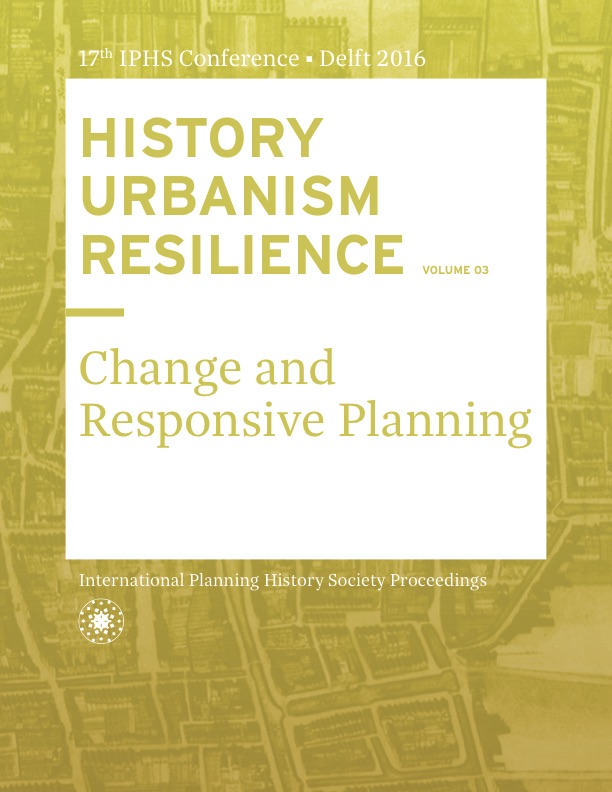A democratic city? The impact of public transport networks on social cohesion
DOI:
https://doi.org/10.7480/iphs.2016.3.1263Abstract
Urbanity is political. Thus, urbanists have to engage with political issues and systems in order to address injustices of the past, and create a more equitable present. Especially in the context of South African cities, which are still dominated by apartheid morphologies. 2016 marks South Africa’s 22nd year into democracy, but what are the achievements and advancements in transforming the spatial legacy the ‘new’ country inherited from the Apartheid dispensation? Moreover, what are the characteristics of a post-apartheid, democratic city and society? The City of Johannesburg, the local authority of the Johannesburg Metropolitan regions, believes that transport networks must play a role to support the creation of social cohesion in a highly segregated city to address the spatial legacy of apartheid. It has therefore implemented a number of transport oriented development plans throughout the city including the Corridors of Freedom development plan.This paper unpacks theory around the concept of social cohesion, in order to understand why this is relevant to planning trajectories in South Africa. Furthermore, it discusses social, economic and spatial legacies to which planning needs to respond. It examines the Corridors of Freedom, a ‘Transit Orientated Development’ framework proposed by the City of Johannesburg aimed at “stitching” the city together. It critically analyses the plan’s objectives and how it addresses issues of social cohesion to highlight some of the strengths and shortcomings of the proposed ‘Corridors’.
References
Bonner, Philip and Nieftagodien, Noor. Alexandra: A History. Johannesburg: Wits University Press. 2008
Bruhn, John G. The Concept of Social Cohesion. The Group Effect. Springer Science+Business Media, LLC, 2009.
Burdett, Ricky. Designing Urban Democracy: Mapping Scales of Urban Identity. Public Culture, 25(2), pp. 349-365, 2013.
City of Joburg (CoJ) Metropolitan Municipality. Integrated Transport Plan 2003-2008 Executive Summary. Johannesburg, 2003.
City of Joburg (CoJ) Metropolitan Municipality. Corridors of Freedom: Re-stitching Our City to Create a New Future. Central Strategy Unit Office of Executive Mayor. Johannesburg, 2013a.
City of Joburg (CoJ) Metropolitan Municipality. Louis Botha Avenue: Development Corridor Strategic Area Framework. Central Strategy Unit Office of Executive Mayor. Johannesburg, 2014.
City of Joburg (CoJ) Metropolitan Municipality. Joburg 2040: Growth and Development Strategy. Central Strategy Unit Office of Executive Mayor. Johannesburg, 2011.
Hansen, Ludwig and Kotze, Paul. Section1: Which Crisis?. Transportation and Place-Making: The Contribution of Public Transport Initiatives to the Quality of the Urban Environment in Gauteng: Arch SA, Volume 57 sep/oct, pp. 17-21, 2012.
Harvey, David. The right to the city. New Left Review, 53 (Sep/Oct), 23-40, 2008.
Jenson, Jane. Mapping Social Cohesion: The State of Canadian Research. Canadian Policy Research Networks, CPRN Study No. F|03. Ottawa, 1998.
Kurdistani, Payam M et al. Democratic Urban Street Design Guideline Codifications. Arnanshahr Architecture & Urban Development, 4 (6), pp. 71-78, 2012.
Louw, Eric P. The Rise, Fall and Legacy of Apartheid. Praeger Publishers. 2004
Maseng, Kabelo. Corridors of Freedom Aims To Help Integrate Joburg Residents. Northcliff Melville Times, 17 May, 04, 2013
Murray, Martin J. The Evolving Spatial Form of Cities in a Globalising World Economy- Johannesburg and Sảu Paulo. HSRC Publishers, 2004.
Morris, Michael. Apartheid: An Illustrated History. Jonathan Ball Publishers. 2012
Schmitt, Regina. Social Cohesion as an Aspect of the Quality of Societies: Concept and Measurement. EuReporting Working Paper No. 14. Centre for Survey Research and Methodology (ZUMA). Social indicators Department Mannheim, 2000.
Thakurdin, Karishma and Maseng, Kabelo. It’s All Systems Go: Rea Vaya World Class System to be Launched in October. Northcliff Melville Times, 17 May, 01, 2013.

